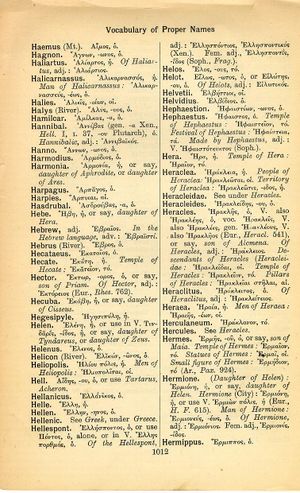Hera: Difference between revisions
From LSJ
(Gf-D_4) |
(3_6) |
||
| Line 10: | Line 10: | ||
{{Gaffiot | {{Gaffiot | ||
|gf=(2) <b>Hēra</b>, æ, f. (Ἥρα),<br /><b>1</b> la déesse Héra [Junon chez les Romains] : [[Sol]]. 2, 10<br /><b>2</b> v. de Sicile : Cic. Att. 2, 1, 5. | |gf=(2) <b>Hēra</b>, æ, f. (Ἥρα),<br /><b>1</b> la déesse Héra [Junon chez les Romains] : [[Sol]]. 2, 10<br /><b>2</b> v. de Sicile : Cic. Att. 2, 1, 5. | ||
}} | |||
{{Georges | |||
|georg=(2) Hēra<sup>2</sup>, ae, f. ([[Ἥρα]]), die [[Göttin]] [[Hera]] der Griechen, die [[Juno]] der [[Römer]], Solin. 2, 10. – Dav. Hēraea, ōrum, n. (Ἡραια), das Herafest ([[mit]] öffentlichen Spielen verbunden), Liv. 27, 30, 9. | |||
}} | }} | ||
Revision as of 09:25, 15 August 2017
English > Greek (Woodhouse)
Ἥρα, ἡ.
Temple of Hera: Ἡραῖον, τό.
Latin > English (Lewis & Short)
Hēra: ae, f., = Ἥρα,
I another name of Hybla Minor in Sicily, Cic. Att. 2, 1, 5.
Hēra: ae, f., = Ἥρα,
I the Grecian goddess Hera, corresp. to the Juno of the Romans, Sol. 2, 10; Inscr. Orell. 2225 (although here, perh., HERA is i. q. FORTVNA). —
II Deriv.: Hēraea, ōrum, n., = Ἡραῖα, τά, the festival of Hera, Liv. 27, 30, 9 sq.
Latin > French (Gaffiot 2016)
(2) Hēra, æ, f. (Ἥρα),
1 la déesse Héra [Junon chez les Romains] : Sol. 2, 10
2 v. de Sicile : Cic. Att. 2, 1, 5.
Latin > German (Georges)
(2) Hēra2, ae, f. (Ἥρα), die Göttin Hera der Griechen, die Juno der Römer, Solin. 2, 10. – Dav. Hēraea, ōrum, n. (Ἡραια), das Herafest (mit öffentlichen Spielen verbunden), Liv. 27, 30, 9.

